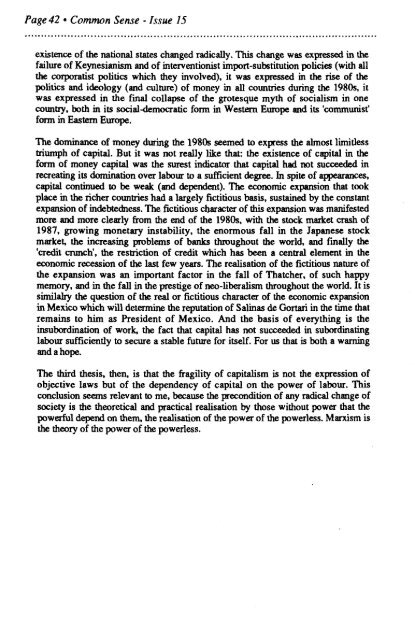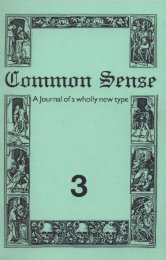i on thomas paine reviews: origins of crisis in ussr - Common Sense
i on thomas paine reviews: origins of crisis in ussr - Common Sense
i on thomas paine reviews: origins of crisis in ussr - Common Sense
Create successful ePaper yourself
Turn your PDF publications into a flip-book with our unique Google optimized e-Paper software.
Page42 Comm<strong>on</strong> <strong>Sense</strong> - Issue 15<br />
existence <strong>of</strong> the nati<strong>on</strong>al states changed radically. This change was expressed <strong>in</strong> the<br />
failure <strong>of</strong> Keynesianism and <strong>of</strong> <strong>in</strong>terventi<strong>on</strong>ist import-substituti<strong>on</strong> policies (with all<br />
the wrporatist politics which they <strong>in</strong>volved). it was expressed <strong>in</strong> the rise <strong>of</strong> the<br />
politics and ideology (and culture) <strong>of</strong> m<strong>on</strong>ey <strong>in</strong> all countries dur<strong>in</strong>g the 1980s. it<br />
was expressed <strong>in</strong> the f<strong>in</strong>al collapse <strong>of</strong> the grotesque myth <strong>of</strong> socialism <strong>in</strong> <strong>on</strong>e<br />
country, both <strong>in</strong> its socialdemocratic form <strong>in</strong> Western Europe and its 'communist'<br />
form <strong>in</strong> Eastern Europe.<br />
The dom<strong>in</strong>ance <strong>of</strong> m<strong>on</strong>ey dur<strong>in</strong>g the 1980s seemed to express the almost limitless<br />
triumph <strong>of</strong> capital. But it was not really like that: the existence <strong>of</strong> capital <strong>in</strong> the<br />
form <strong>of</strong> m<strong>on</strong>ey capital was the surest <strong>in</strong>dicator that capital had not succeeded <strong>in</strong><br />
recreat<strong>in</strong>g its dom<strong>in</strong>ati<strong>on</strong> over labour to a sufficient degree. In spite <strong>of</strong> appearances.<br />
capital c<strong>on</strong>t<strong>in</strong>ued to be weak (and dependent). The ec<strong>on</strong>omic expansi<strong>on</strong> that took<br />
place m the richer countries had a largely fictitious basis. susta<strong>in</strong>ed by the c<strong>on</strong>stant<br />
expansi<strong>on</strong> <strong>of</strong> <strong>in</strong>debtedness. The fictitious character <strong>of</strong> this expansi<strong>on</strong> was manifested<br />
more and more clearly from the end <strong>of</strong> the 1980s. with the stock market crash <strong>of</strong><br />
1987, grow<strong>in</strong>g m<strong>on</strong>etary <strong>in</strong>stability, the enormous fall <strong>in</strong> the Japanese stock<br />
market the <strong>in</strong>creas<strong>in</strong>g problems <strong>of</strong> banks throughout the world, and f<strong>in</strong>ally the<br />
'credit crunch', the restricti<strong>on</strong> <strong>of</strong> credit which has been a central element <strong>in</strong> the<br />
ec<strong>on</strong>omic recessi<strong>on</strong> <strong>of</strong> the last few years. The realisati<strong>on</strong> <strong>of</strong> the fictitious nature <strong>of</strong><br />
the expansi<strong>on</strong> was an important factor <strong>in</strong> the fall <strong>of</strong> Thatcher, <strong>of</strong> such happy<br />
memory, and <strong>in</strong> the fall <strong>in</strong> the prestige <strong>of</strong> neo-liberalism throughout the world. It is<br />
similalry the questi<strong>on</strong> <strong>of</strong> the real or fictitious character <strong>of</strong> the ec<strong>on</strong>omic expansi<strong>on</strong><br />
<strong>in</strong> Mexico which will determ<strong>in</strong>e the reputati<strong>on</strong> <strong>of</strong> Sal<strong>in</strong>as de Gortari <strong>in</strong> the time that<br />
rema<strong>in</strong>s to him as President <strong>of</strong> Mexico. And the basis <strong>of</strong> everyth<strong>in</strong>g is the<br />
<strong>in</strong>subord<strong>in</strong>ati<strong>on</strong> <strong>of</strong> work, the fact that capital has not succeeded <strong>in</strong> subord<strong>in</strong>at<strong>in</strong>g<br />
labour sufficiently to secure a stable future for itself. For us that is both a warn<strong>in</strong>g<br />
and a hope.<br />
The third thesis, then, is that the fragility <strong>of</strong> capitalism is not the expressi<strong>on</strong> <strong>of</strong><br />
objective laws but <strong>of</strong> the dependency <strong>of</strong> capital <strong>on</strong> the power <strong>of</strong> labour. This<br />
c<strong>on</strong>clusi<strong>on</strong> seems relevant to me, because the prec<strong>on</strong>diti<strong>on</strong> <strong>of</strong> any radical change <strong>of</strong><br />
society is the theoretical and practical realisati<strong>on</strong> by those without power that the<br />
powerful depend <strong>on</strong> them, the realisati<strong>on</strong> <strong>of</strong> the power <strong>of</strong> the powerless. Manrisrn is<br />
the theory <strong>of</strong> the power <strong>of</strong> the powerless.



